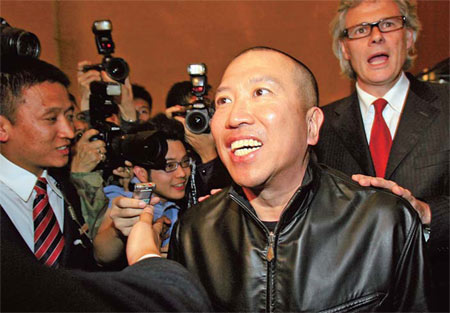Society
Hostages to fortune fight for rich pickings
By Timothy Chui (China Daily)
Updated: 2011-02-10 07:22
 |
Large Medium Small |
Childhood playmates, the couple married in 1955 and together grew Teddy Wang's father's paint and chemical business into one of Hong Kong's biggest companies. They diversified into pharmaceuticals and later, when Nina assumed the chairmanship, into property
Their sterling success soon attracted schemers, who kidnapped Teddy Wang when their car was hijacked in April 1983, holding him hostage for eight days chained to a bed until Wang paid a HK$33 million ransom.
Seven years later, Teddy was once again kidnapped at the age of 57 outside the Hong Kong Jockey Club. His captors demanded HK$60 million. Despite payments in HK$30 million installments, he was never returned. Some of the captors were eventually apprehended, professing that Teddy had been thrown from a sampan where he was being held, but the body was never found.
It was during Teddy's prolonged absence that Nina Wang became close with Chan, who gained her confidence by appealing to her belief that her husband was still alive. He was seen taking Wang to temples in Sai Kung and Kau Sai Chau to perform rituals to speed her husband's safe return.
Teddy was declared legally dead in 1999, and a series of court battles was launched, first between Nina Wang and her father-in-law, Wang Din-shin.
Nina Wang produced a 1990 will witnessed by the family butler and written in Chinese save for a single phrase in English, "one life, one love," that gave her the entire estate. Her father-in-law countered with a 1968 will - supposedly made when Nina Wang had an affair - that named him the sole beneficiary.
The High Court ruled in favor of Wang Din-shin in 2002 after a court battle of more than 170 days. Nina Wang lost an appeal in 2004 and was charged with forgery in 2005. In September 2005, the Court of Final Appeal overturned the lower court's ruling and ceded the fortune back to Nina Wang. The forgery charge was dropped, publicly exonerating her.
Around the time of her victory, Wang was diagnosed with cancer, reportedly ovarian cancer, and Chan told her he could help her overcome the disease.
|
 |
|
Tony Chan is appealing a court ruling that a will naming him as sole benefi ciary of Nina Wang’s fortune was a forgery (2010 photo). |
Chan was recognized by lawmaker Chim Pui-chung as a celebrity feng shui master who rubbed elbows with the city's political elite. But Chan's resume shows a greater breadth of experience gathered from his days as a bartender, machinery salesman, market researcher and waiter.
While Chan's detractors have painted him as having a Svengali-like grip over Wang or as a eunuch serving an empress dowager, Chan claims he was the passive partner in their 15-year relationship. He portrayed himself as a humble small potato before Wang began remunerating him lavishly for his companionship.
|
 Nina Wang was believed to be Asia’s richest woman when she died in 2007. Her estimated net worth then was US$4.2 billion (2002 photo). |
Chan told the court they were deeply in love by the time his wife was pregnant with his eldest son, Weathee, and that Wang called him husband while he stayed at her apartment.
Whether Chan will be able to lay his hands on the fortune again, he was already a very rich man. Testimony showed that Wang had arranged late-night deliveries to Chan, by truck, of some HK$700 million each in cash.
Holding at least five properties worth more than HK$50 million including addresses in the prestigious Mid-levels and Peak areas of Hong Kong, Chan also had a penchant for European cars and was director of a company that manages a fleet of private jets. In court, he said Wang had paid and given him approximately HK$4 billion.
Lawyers' role
Although lawyers rely on the instructions of clients, they are also tasked to give independent advice and to sniff out irregularities in wills that could be exploited.
Whether a will had subtle omissions, was vague or was so-called air-tight, legal practitioners could raise the question in court whether specific bequests were correct or the true intention of the will maker, said Ma, the inheritance lawyer. Most disputes are borne out of questions whether the will maker had the capacity to properly write a will, especially wills written by those who are dying and may be mentally diminished, he said.
In cases of forgery, the burden of proof is quite high, Ma said, and those cases depend heavily on expert testimony and the circumstances in which the will was written.
Make it easier on your family; don't die out of town
HONG KONG - The integration of the Hong Kong Special Administrative Region and Chinese mainland adds complications to dealing with property and other assets disposed of in wills. To make it more complex, add continued investment in the mainland and the legal recognition of death under different legal systems.
| 分享按鈕 |